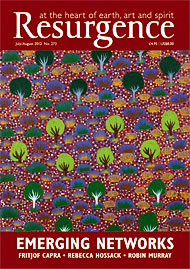Myth and symbolism illuminate human experience to the depths and, being timeless, trigger recognition and the possibility of transformation. Playing with symbolism in a modern way can often jar or simply fall flat because writers who dabble with such a complex frame of reference lack sufficient understanding of the language. Not so here. Underpinning what is, at times, an uproariously funny novel is a deep and comprehensive knowledge of the imagery of the Tarot, the vivid mythology of the horse, and the ancient principles of spiritual Alchemy.
It is by a master wordsmith, Jeremy James, whose rich and seductive prose has told many a powerful story in books about his worldwide travels on horseback, but here it is a foolish medieval knight who does the riding, on a magnificent blue horse, accompanied by a beautiful green-eyed enchantress. The knight is on a quest to find “the monster who masters the Wize Azul” and he appears in a series of intense dreams, which both disturb and obsess a young man living a grim life in a time somewhere in the not-too-distant future. This young man, Xavier Perdue (note the name), struggles to escape the clutches of a bleak and soulless city-state where all movement and action is monitored by the one, sinister institution that has replaced all democratic government: the Health and Safety Executive.
The entire book is drenched in symbolism. Xavier opens his eyes to a hangover on his 34th birthday, a number surely not chosen by chance, three and four being symbolic of Heaven and Earth. He has reached, traditionally, the midpoint of life, when introspection begins to question and seek reconciliation of the paradoxes of life. This is precisely what happens to Xavier as he begins to question why an electronic chip was inserted in his wrist at birth so that the Executive can carry out its comprehensive surveillance of the population. He realises that its manipulation of the constantly chunnering media conditions the populace to abandon anything of intrinsic worth. Beauty has been usurped by the hideous, excellence dispelled by the commonplace, and consumption is the government’s only and constant cry. Everyone by law must also seek their entertainment in vast recreational warehouses called Oblivion, which serve state-subsidised alcohol 24 hours a day, even to children as young as 14. It all sounds horribly familiar.
Xavier’s epiphany comes in Oblivion when he meets Eppy, a beguiling girl with “lion-green” eyes who kindles his search for the self-governing principle his state-sponsored debauchery has suffocated. As his dreams grow more vivid, so Eppy’s character merges with that of the enchantress Epsibar Sophia, who accompanies the foolish knight and his ethereal blue horse. We follow their journey from the land of Calcination into the land of Dissolution where they are arraigned before the terrifying Court of the Mot Juste, presided over by a crazy cockerel who escalates the charge from “guilty” to “even more guilty” before all three, the blue horse included, are condemned by a jury of braying cattle and panicking sheep to languish in the land of Oblivion. And so they search the lands of Separation, Conjunction, Fermentation and Distillation for their final, transformative battle with the monster who masters the Wize Azul, and as they do so, Xavier’s life is also transformed, and with it the apparently hopeless state of the world around him.
Each of the 22 chapters of this extraordinary book is named after a chapter in the Major Arcana, and the journey of the knight depicts the alchemical journey of the Fool to the World, revealing a subtle yet powerful wisdom: that the soul is a divine and fragile craft, which, if surrendered to the malignancy of an outer authority, will shatter the alchemy of our lives, and with it the character of our culture. Why else did London suffer riots last summer?
“Life is Nature,” Xavier says at one point. How true. Nature works at her own rhythm. Thus, as everything naturally transforms through the cycle of the seasons, so it is our nature, too, to transform. We only prevent it by disconnecting ourselves from Nature’s rhythms and ignoring our intuitive sense and the call of the soul. We give in to fear and cling to doubt, whereas Nature has no fear, she does not doubt, nor does she invite defeat.
Such profundity never gets heavy in this witty adventure, because it leaps from the page in breathtaking sequences, conveyed by a storyteller who keeps the drama drum-tight throughout. It is a beautiful book, too, presented by the remarkable publisher Mike Goldmark, himself an almost mythical figure who actually appears as a character in a book that is both a satire on what lies so dangerously close to the surface in our present vapid culture, and an exposition of the antidote.
It is written by an unsung genius of our day who is at the height of his powers here. He plays in the light of a wisdom hard won on his own difficult journey, much of it with a horse who could very well be the blue horse here; a horse who, if I read the symbolism aright, represents what we need to trust most if we hope to transform the world.
Read the book; you’ll see. You’ll laugh and you will certainly cry, but you will see.






